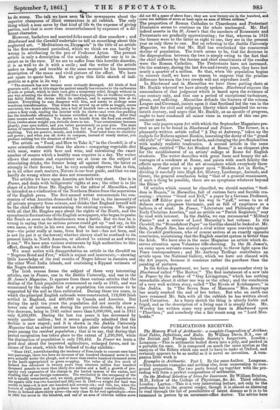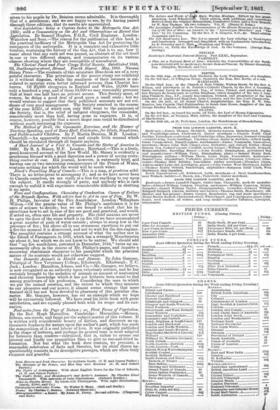PUBLICATIONS RECEIVED.
The Memory Work of Arithmetic: a complete Compendium of Arithme- tical Tables, Definitions, and Rules. By William Davis, B.A. one of the British and Foreign Schools Society's Inspectors. London : Longman.—This is arithmetic boiled down into a jelly, and packed in a portable tin case. It is composed on much the same system as the analysis of the Ethics which one used to have to make at Oxford, and certainly appears to be as useful as it is novel an invention. A. com- panion little work is Examples in Arithmetic. Part I. By the same Author. Longman. —This contains examples and nothing else, from numeration to com- pound proportion. The two parts bound up together with the pre- ceding will form a perfect compendium of arithmetic. On the Medical Selection of Lives for Insurance. By William Brinton, M.D., Fellow of the College of Physicians, &c. &c. Third edition. London: Layton.7-This is a very interesting lecture, not only to the profession but to the general reader, though it is almost as alarming to read through the list of possibilities of latent disease as it is to be examined in person by an assurance-office doctor. The advice here
given to his pupils by Dr. Brinton seems admirable. It is-thoroughly that of a gentleman; and we are happy to see, by its having passed through three editions, that its merits are appreciated.
Gas Legislation: being a Copious Index to the Metropolis Gas Act, 1860 ; with a Commentary on the Act and Observations on Recent Gas Ieffislation. By Samuel Hughes, F.G.S., Civil Engineer. London : Waterlow and Sons.—The reason for the publication of this book is the practical inefficacy of the Metropolis Gas Act for protecting the ratepayers of the metropolis. It is a complete and exhaustive little treatise, containing the history of the Gas Act, that is to say, how it came about that any such act was passed, an abstract of the act itself in one or two different shapes, and commentaries on its various ,clauses showing where they are susceptible of amendment. The Clerical Fund and Poor Clergy Relief Society. Established 1866, 32, Southampton-street, Strand. Fourth Report. May, 1861. Nassau -Steam Press.—The contents of this miniature Blue-book are of a very .painful character. The privations of the poorer clergy are exhibited In it without disguise, while the smallness of their incomes is cal- culated to surprise even better informed persons than Chartist lec- turers. Of 20,000 clergymen in England and Wales, 10,000 have ,only a hundred a year, and of those 10,000 we may reasonably presume that at least one half have no private means. This Society must, of course, be doing a good deal of good upon a small scale ; but we would venture to suggest that their published accounts are not evi- dence of very good management. The Society received in the course of the year 2237/., of which sum only 9561. went to the purposes of the Society, that is, the relief of indigent clergymen, the remainder, considerably more than half, having gone in expenses. It is, of course, however, possible that a much larger sum could be distributed without much increasing the expenses. The Method of Drill, the Gymnastic Exercises, and the Manner qf Teaching Speaking, used at Essex Hall Colchester, for Idiots, Simpletons, and Feeble-minded Children. By P. Martin Duncan, M.B. London : .Churchill.—An apparently rational and simple little manual which Should be circulated through all lunatic asylums. A Short Journal of a Visit to Canada and the States of America in 1860. By R. A. Blaney, M.P. London: Hatchard.—This is a lively, good-humoured account of the New World. Mr. Blaney is evidently a gentleman blessed with a good digestion and a power of seeing every- thing couleur de rose. His journal, however, is extremely brief and .barring one or two interesting reminiscences of the Prince of Wales, contains nothing for which the world will be much wiser. Black's Travelling Map of Canada.—This is a map, et presterea nihil. There is no letter-press to accompany it; and as we have never been
• to Canada ourselves, we are really at a loss for anything to say upon the subject. It smells strongly of paste, and anybody who is rash enough to unfold it will experience considerable difficulty in shutting it up again.
Fires and Conflagrations. Chemistry of Combustion. Causes of Failure e the Brigade System. With advice how to Act in case of Firi. By W. H. Philips, Inventor of the Fire Annihilator. London :1 Effingliam Wilson.—Of the precise value of Mr. Philips's annihilator it is for men of science to decide; but we are bound to admit that his in- structions how to act in case of fire are good and practical, and would, if acted on, often save life and property. His chief maxims are never to open the door of the room which is on fire till we have accumulated a great number of pails of water outside; always to stoop low in the presence of fire ; but above all to use strenuous exertions to put out a fire the moment it is discovered, and not to wait for the fire-engines. Thepamphlet contains a strange account of what the author saw in the Island of Farmar,,osta in 1831, which has a strangely__Munchausian air about it, but which we do not know to be untrue. We should add that "my fire annihilator, patented in December, 1844," turns up un- necessarily often in the course of Mr. Philips'spages, and imparts a somewhat charlatanic character to his pamphlet which the practical nature of its contents would not otherwise suggest.
Our Domestic Animals in Health and Disease. By John Gamgee Principal of New Veterinary College, Edinburgh. Edinburgh : T. d. Jack; London : Hamilton, Adams, and Co.—Mr. Gamgee, we believe, is now recognized as an authority upon veterinary science, and he has certainly brought to the maladies of animals an amount of anatomical and chemical knowledge which it has not hitherto been usual to find among gentlemen of his profession. Considering the uses to which we put the animal creation, and the extent to which they minister to our pleasures and our power, it almost seems strange that more trained skill has not been devoted to pharmacy of this peculiar cha- racter. Mr. Gamgee, however, has set an example which we hope • will be extensively followed. We have read his little book with great satisfaction, and are equally pleased both with its scope and its exe- cution.
Foot-notes from the Page of Nature ; 02.2 First Forms of Vegetation. By the Rev. Hugh Macmillan. Cambridge : Macmillan.—Mosses, lichens, sea-weeds, and fungi are the subject-matter of this volume. It is written with considerable beauty of diction, and discovers an en- thusiastic fondness. for nature upon the author's part, which has made the composition of it a real labour of love. It was originally published in the Shape of lectures, and perhaps its general tone is more adapted for listeners than readers—calculated, that is, rather to arouse our interest and kindle our sympathies than to give us cut-and-dried in- formation. Not but what the book does contain, wepresume, a reasonable substratum of facts and theories, but its chief charm un- questionably consists in its descriptive passages, •which are often truly eloquent and graceful.































 Previous page
Previous page